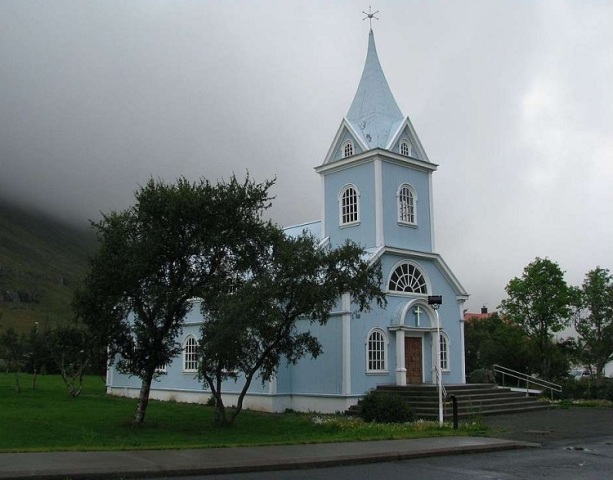Iceland is considered to be the second largest island of Europe. Check out some interesting and fun facts about Iceland.
Facts About Iceland
Iceland was initially a settlement for the Nordic people in the early 9th century, who spoke the language of the Vikings. One of the few remaining settlements supporting Norse traditions, Iceland is a very popular site for tourism. Located in the Mid-Atlantic ridge, Iceland is considered to be the second largest island in Europe. It is a hot spot for volcanic and other geothermal activity and measures around 103,000 sq. kilometers, which is larger than Scotland or Ireland by one-thirds. Some parts of Iceland are largely uninhabited or with sparse population, because most of the population is concentration in the high interiors of the country. It has many glaciers and mountains and other natural formations like natural hot water springs and rivers. Almost 30 post-glacial volcanoes have erupted in the past two centuries and the geography of this place is still being formed. Do you believe that you know all about this beautiful country? If not, check out some interesting and fun facts about Iceland.

Image: By Bromr (Own work) [GFDL (http://www.gnu.org/copyleft/fdl.html) or CC-BY-SA-3.0-2.5-2.0-1.0 (http://creativecommons.org/licenses/by-sa/3.0)], via Wikimedia Commons
Fast Facts
Continent: Europe
Area: 103,001 km2
Capital: Reykjavik
Population: 320,060
Currency: Icelandic króna
Demonym: Icelander
Official Languages: Icelandic
Calling Code: 354
Type Of Government: Parliamentary Republic
Fun Facts About Iceland
- The capital of Iceland is known as Reykjavik, which means ‘Smoky Bay’. This place has a population of approximately 108,000 people.
- Apt to its name, almost 7,250 sq. kilometers of Iceland is covered with ice and glaciers. Out of the total area, land measures around 100,250 sq. kilometers and water is spread over an area of 2,750 sq. kilometers.
- Pop star, Bjork, hails from this impressive country.
- Iceland boasts of an impressive healthcare system and the life expectancy in this place is one of the highest in the world; 81.3 years for women and 76.4 for men.
- The literacy rate of Iceland is 99.9%. This is attributed to the fact that education is compulsory for children aged between 7-16 years. The literacy rate of Iceland is the highest in the world.
- Iceland’s deepest lake is Oskjuvatn, situated near Viti and the deepest point goes down to around 220 meters. The highest peak of Iceland is Hvannadalshnjukur and goes to a height of 2,119 meters.
- Did you know, Iceland has the highest number of internet broadband connections per capita in the world?
- In Iceland, only 1% land is considered arable and cultivation is possible only on that area. Only a quarter of the country is covered with vegetation and just about 1% in that is covered with trees!
- Iceland is home to a variety of flora and fauna and has some really exotic species of birds and animals. The wild animals include arctic fox, mink, mice, rats, rabbits, polar bears, whales and reindeer. The bird population basically comprises of a variety of sea birds.
- Icelandic people are known for their dedication and productivity at work. They value literacy and hold the world’s highest record for the most number of books in a country.
- According to a study Iceland has the happiest people on earth.
- Iceland has the highest birth rate in Europe, highest divorce rate and the highest percentage of women working outside the home.
- Icelanders buy the most books per capita in the world.
- In Iceland, life expectancy for men is the highest in the world.
- Iceland is the only country in NATO with no armed forces.
- Iceland has the highest ratio of mobile telephones to population.
- Iceland is ranked as the most sparsely populated country in Europe and served as the settlement for Nordics and Scandinavian sailors during the 9th and 10th centuries, respectively.
- Iceland is considered as the 4th most productive country in the world on the basis of nominal Gross Domestic Product per capita, which is US$54,858 and the 5th most productive on the basis of GDP at purchasing power parity, which is US$40,112.
- It is said that many Icelanders believe in Elves, even to this date. Certain routes and roads have been re-routed in order to avoid disturbance in the areas where the Elves are believed to live.
- The language that Icelanders speak has not been changed in the past 1000 years.
- The chief source of income in this country, comes from fishing.
- Even to this date, more than 90% of Icelandic people are believers of ‘Lutherism’.
See also
More from iloveindia.com
- Home Remedies | Ayurveda | Vastu | Yoga | Feng Shui | Tattoos | Fitness | Garden | Nutrition | Parenting | Bikes | Cars | Baby Care | Indian Weddings | Festivals | Party ideas | Horoscope 2015 | Pets | Finance | Figures of Speech | Hotels in India : Delhi | Hyderabad | Chennai | Mumbai | Kolkata | Bangalore | Ahmedabad | Jaipur
- Contact Us Careers Disclaimer Privacy Policy Advertise With Us Lifestyle Sitemap Copyright iloveindia.com. All Rights Reserved.







